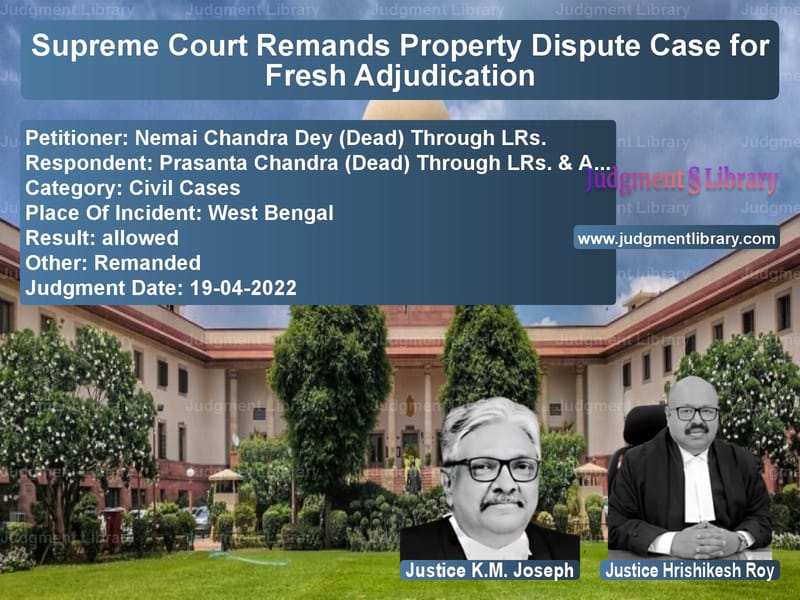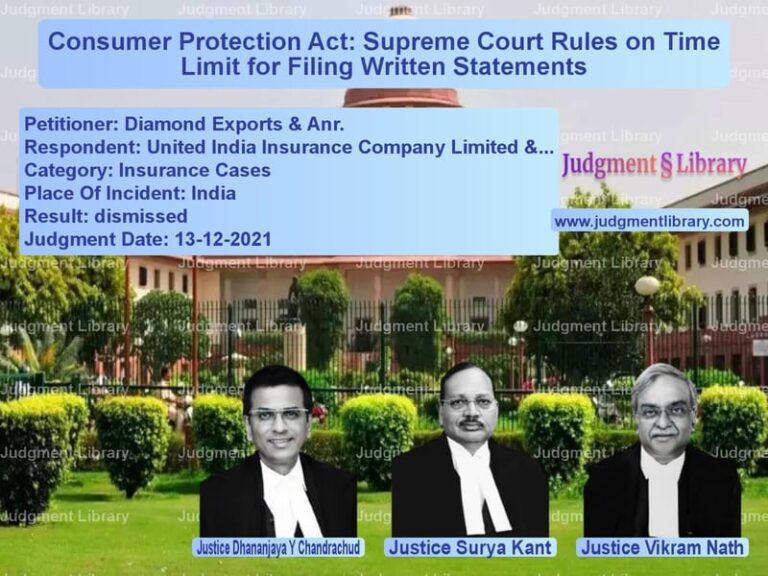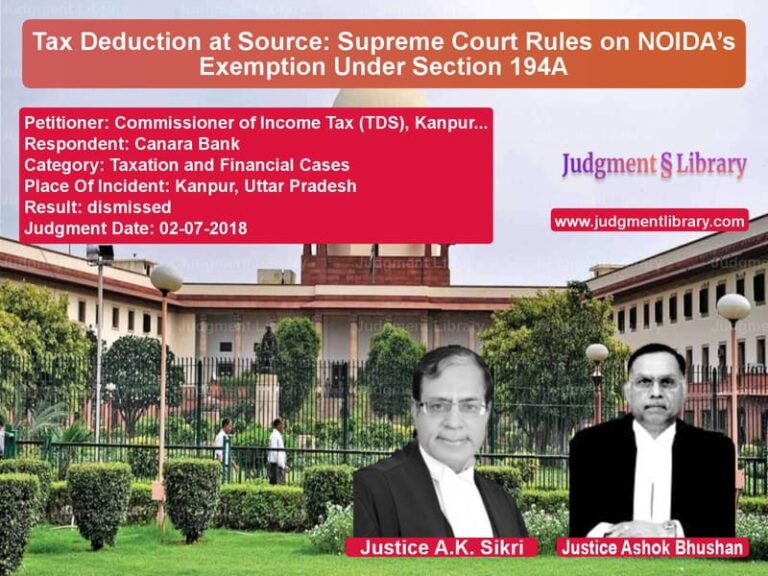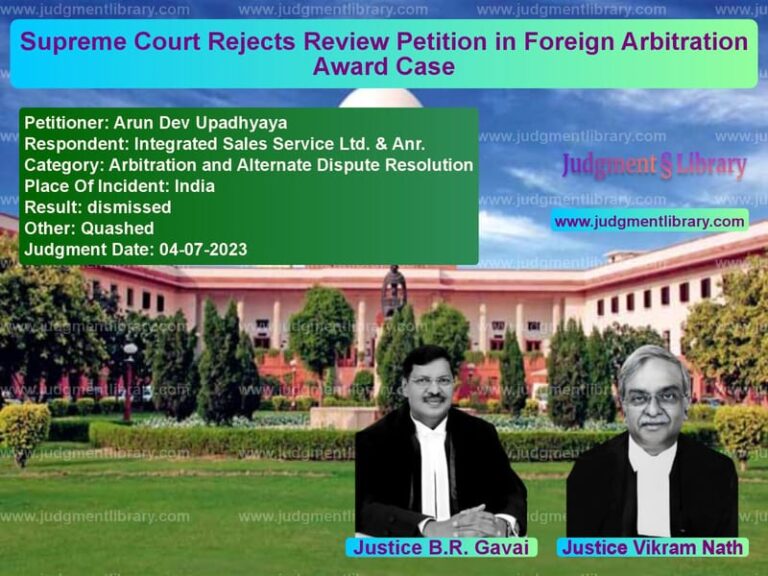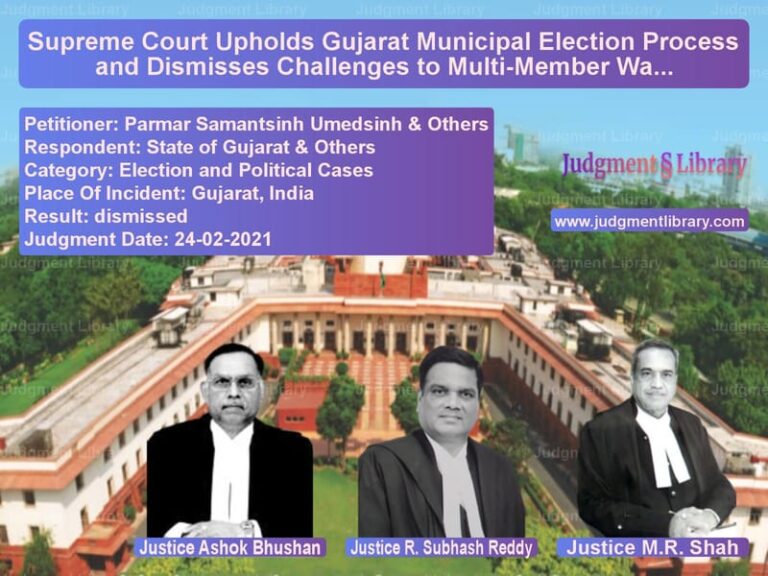Supreme Court Remands Property Dispute Case for Fresh Adjudication
The case of Nemai Chandra Dey (Dead) Through LRs. vs. Prasanta Chandra (Dead) Through LRs. & Anr. revolves around a long-standing property dispute regarding two gift deeds executed in 1990. The Supreme Court found that the first appellate court failed in its duty to properly re-evaluate the case and, therefore, remanded the matter for fresh adjudication.
Background of the Case
The dispute originated in 1999 when the plaintiff, Nemai Chandra Dey, challenged two gift deeds dated July 29, 1990, and July 30, 1990, seeking a declaration that they were null and void. The plaintiff claimed that the gift deeds were executed under misrepresentation, as he believed them to be powers of attorney.
Key developments in the case:
- 1990: Execution of the two disputed gift deeds.
- 1999: The plaintiff filed a suit challenging the validity of the gift deeds.
- Trial Court Ruling: The trial court declared the gift deeds void and ruled in favor of the plaintiff.
- First Appellate Court Ruling: Affirmed the trial court’s decision without properly analyzing the evidence.
- High Court Ruling: Rejected the second appeal and upheld the lower court’s ruling.
- Supreme Court Ruling: Found that the first appellate court had failed to discharge its duty and remanded the case for fresh adjudication.
Petitioners’ Arguments
The appellants, represented by their legal counsel, contended:
“The first appellate court failed to perform its duty in reassessing the evidence and did not engage with the legal contentions raised by the defendants.”
Key points raised:
- The first appellate court did not fulfill its duty to reappreciate the evidence.
- The trial court wrongly assumed that the plaintiff was a pardahnashin lady who could not have understood the nature of the documents.
- The burden of proof was incorrectly applied.
- The trial court did not consider the implications of the Registration Act, 1908, which mandates clear intent for property transfer.
- Legal precedents regarding misrepresentation and undue influence were not properly considered.
Respondents’ Arguments
The respondents, defending the original trial court ruling, argued:
“The findings of the trial court were based on sound legal reasoning, and there was no need for the appellate court to interfere with well-founded conclusions.”
Key counterarguments:
- The plaintiff consistently maintained that he had been misled into executing the gift deeds.
- The trial court correctly ruled that the character of the documents was not explained to the plaintiff.
- The first appellate court simply affirmed the factual findings of the trial court, which it was entitled to do.
- The challenge to the validity of the gift deeds came nine years after their execution, raising questions of delay.
- The gift deeds were registered, and the presumption of validity was in favor of the defendants.
Supreme Court’s Observations
The Supreme Court bench, comprising Justices K.M. Joseph and Hrishikesh Roy, held that the first appellate court had failed to discharge its duty in properly evaluating the evidence.
The Court emphasized:
“The appellate court must reappreciate the evidence, consider the arguments, and apply the law before arriving at findings. Failure to do so results in a miscarriage of justice.”
Key findings:
- The appellate court’s judgment lacked reasoning and legal analysis.
- The High Court wrongly presumed that the appellate court’s findings were proper.
- The appellate court did not apply the proper standard for assessing undue influence and misrepresentation.
- The burden of proof was improperly shifted, as the plaintiff had not provided strong evidence of coercion.
Legal Precedents Considered
The Supreme Court referred to several important rulings:
- Ramesh Kumar vs. Kailash Bansal (2010): Stressed that appellate courts must independently evaluate the evidence.
- Gurdev Kaur vs. Kaki (2007): Held that courts must scrutinize claims of undue influence in property transfers.
- Smt. Tarabai vs. G. Krishna (1999): Clarified the burden of proof in cases of alleged misrepresentation.
Final Ruling
The Supreme Court set aside the lower court orders and ruled:
- The case is remanded to the first appellate court for fresh adjudication.
- The appellate court must issue a reasoned decision within six months.
- The parties are to bear their respective costs.
- Evidence regarding the execution of the gift deeds must be re-evaluated.
Conclusion
This ruling underscores the duty of appellate courts to properly evaluate cases and ensures that all parties receive a fair hearing. The Supreme Court’s decision protects property rights and upholds the principle that courts must engage in detailed analysis before affirming or reversing judgments.
Petitioner Name: Nemai Chandra Dey (Dead) Through LRs..Respondent Name: Prasanta Chandra (Dead) Through LRs. & Anr..Judgment By: Justice K.M. Joseph, Justice Hrishikesh Roy.Place Of Incident: West Bengal.Judgment Date: 19-04-2022.
Don’t miss out on the full details! Download the complete judgment in PDF format below and gain valuable insights instantly!
Download Judgment: nemai-chandra-dey-(d-vs-prasanta-chandra-(de-supreme-court-of-india-judgment-dated-19-04-2022.pdf
Directly Download Judgment: Directly download this Judgment
See all petitions in Property Disputes
See all petitions in Specific Performance
See all petitions in Judgment by K.M. Joseph
See all petitions in Judgment by Hrishikesh Roy
See all petitions in allowed
See all petitions in Remanded
See all petitions in supreme court of India judgments April 2022
See all petitions in 2022 judgments
See all posts in Civil Cases Category
See all allowed petitions in Civil Cases Category
See all Dismissed petitions in Civil Cases Category
See all partially allowed petitions in Civil Cases Category

